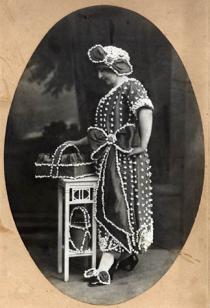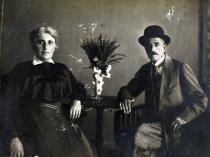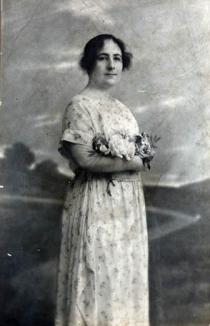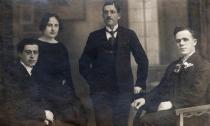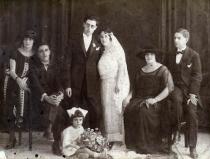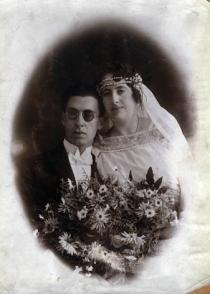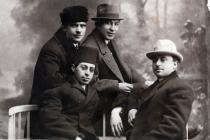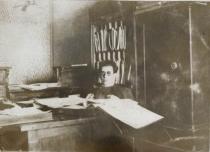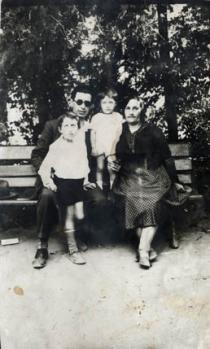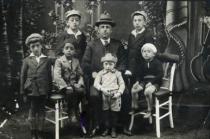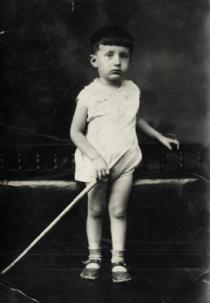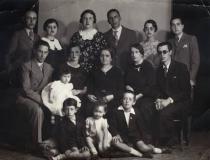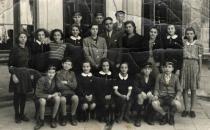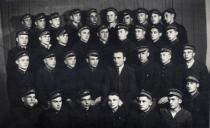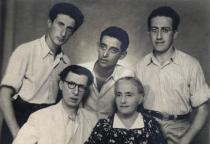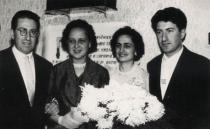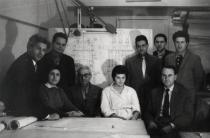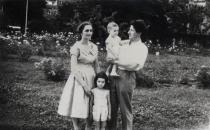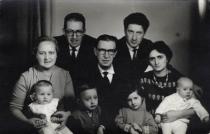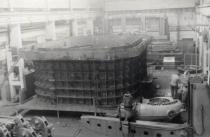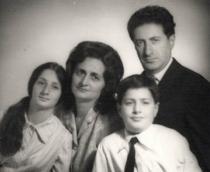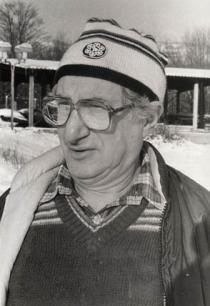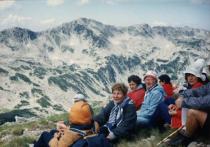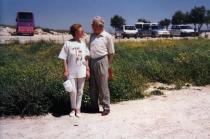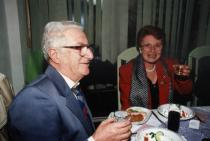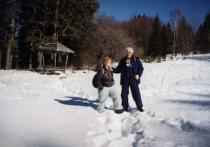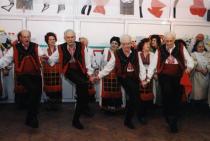This is my mother Rebeka Avram Natan (nee Geron) as a girl dressed for the religious holiday Purim. The picture was taken in Ruse, around 1915.
My mother Rebeka Avram Natan (nee Geron) was born in Razgrad in 1897 or 1898 - we could not find out the exact date. And we always joked with her that we could not celebrate her birthday because we did not know her date of birth. She had a primary education. At home my parents spoke mostly Spanish [Ladino], but when our neighbors came, they spoke Bulgarian. My mother knew Bulgarian because she had worked as a seamstress in a Bulgarian company and she could read in Bulgarian. My parents met in Ruse - my father was on a business trip there and a cousin of my mother's and a friend of his introduced them to each other. They engaged, then they had a religious wedding and went to live in Varna. They dressed in clothes typical for the times. My mother says that my father was a dandy and had a Bohemian lifestyle. When they lived in Varna and my father had a job, they were well-off. He had a big salary, but when my brother was born, my mother got sick and at one moment all the money was gone, even their savings. Then they had to move to Ruse, where my uncle offered my father a job. In Ruse we were never well-off, because only my father worked and my mother was often sick. We lived quite frugally.
My maternal grandfather's name was Avram Geron and my grandmother - Simha. He had a business with leather - he went from village to village, collected leather, processed it and sold it. I remember him. I was six or seven years old when he died and my grandmother died later when I was a university student. They also knew only Spanish [Ladino] and Turkish. They lived in Razgrad, but they did not have their own flat. They had three daughters - Rebeka, Ester and Rashel, and one son Yosif Geron. He was the eldest. During the [First] Balkan War and World War I my uncle and my grandfather enlisted as soldiers. Then the family moved to Ruse and my mother, who was the eldest of the sisters, worked as a seamstress to support her mother and sisters. They did not live in their own flat there either. They dressed in plain clothes. My maternal grandparents were religious, went to the synagogue and we celebrated with them the high holidays like Rosh Hashanah and Yom Kippur. My uncle was also religious but his sisters were not. My grandparents did not go on vacations and they did not have maids.
The Jewish community lived in the Jewish neighborhood which was outside the center of the town. It consisted mostly of one-floor houses and not only Jews lived there. The place where I lived from 4-5 years of age until 13 years of age had four houses in one yard. Jews lived in two of the houses and Bulgarians in the other two. Throughout the years we kept in touch with the children of our Bulgarian neighbors. The mother in one of the families died young and my mother also looked after the children. Turkish people also lived next to us. All the children from the nearby houses gathered together and played games. Our house had three rooms and a kitchen. The four of us - my parents, my brother and I lived there. My grandmother and my uncle paid rent in another house. We had a toilet, a bath and electricity.
At that time there was a variety of Jewish professions. There were rich merchants, street vendors, craftsmen, porters, factory owner such as Avram Ventura. He owned the 'Zhiti' factory, which manufactured bolts, rivets and nails. There were also Jewish workers, but there was also that very nice organization of the Jewish community 'Malbish Arumim', which raised money from the rich and gave breakfast and lunch to the poor children in the Jewish school. It was founded by the Jewish municipality. In the autumn they also bought clothes and shoes for the poor Jewish children. At that time we did not feel anti-Semitism towards us. We were very tolerant to each other. We always took part in the parades and national holidays.

